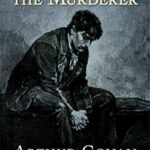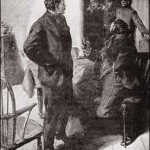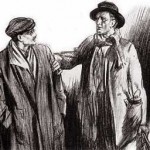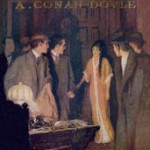“I see,” said I as I glanced down the column, “that the coroner in his concluding remarks was rather severe upon youngMcCarthy. He calls attention, and with reason, to the discrepancy about his father having signalled to him before seeing him also to his refusal to give details of his conversation with his father, and his singular account of his father’s dying words. They are all, as he remarks, very much against the son.”
Holmes laughed softly to himself and stretched himself out upon the cushioned seat. “Both you and the coroner have been at some pains,” said he, “to single out the very strongest points in the young man’s favour. Don’t you see that you alternately give him credit for having too much imaginition and too little? Too little, if he could not invent a cause of quarrel which would give him the sympathy of the jury; too much, if he evolved from his own inner consciousness anything so outre as a dying reference to a rat, and the incident of the vanishing cloth. No, sir, I hall approach this case from the point of view that what this oung man says is true, and we shall see whither that hypothesis ill lead us. And now here is my pocket Petrarch, and not another word shall I say of this case until we are on the scene of action. We lunch at Swindon, and I see that we shall be there in twenty minutes.”
It was nearly four o’clock when we at last, after passing through the beautiful Stroud Valley, and over the broad gleaming Severn, found ourselves at the pretty little country-town of Ross. A lean, ferret-like man, furtive and sly-looking, was waiting for us upon the platform. In spite of the light brown dustcoat and leather-leggings which he wore in deference to his rustic surroundings, I had no difficulty in recognizing Lestrade, of Scotland Yard. With him we drove to the Hereford Arms where a room had already been engaged for us.
“I have ordered a carriage,” said Lestrade as we sat over a cup of tea. “I knew your energetic nature, and that you would not be happy until you had been on the scene of the crime.”
“It was very nice and complimentary of you,” Holmes an- swered. “It is entirely a question of barometric pressure.”
Lestrade looked startled. “I do not quite follow,” he said.
“How is the glass? Twenty-nine, I see. No wind, and not a cloud in the sky. I have a caseful of cigarettes here which need smoking, and the sofa is very much superior to the usual country hotel abomination. I do not think that it is probable that I shall use the carriage to-night.”
Lestrade laughed indulgently. “Yau have, no doubt, already formed your conclusions from the newspapers,” he said. “The case is as plain as a pikestaff, and the more one goes into it the plainer it becomes. Still, of course, one can’t refuse a lady, and such a very positive one, too. She hai heard of you, and would have your opinion, though I repeatedly told her that there was nothing which you could do which I had not already done. Why, bless my soul! here is her carriage at the door.”
He had hardly spoken before there rushed into the room one of the most lovely young women that I have ever seen in my life. Her violet eyes shining, her lips parted, a pink flush upon her cheeks, all thought of her natural reserve lost in her overpower- ing excitement and concern.
“Oh, Mr. Sherlock Holmes!” she cried, glancing from one to the other of us, and finally, with a woman’s quick intuition, fastening upon my companion, “I am so glad that you have come. I have driven down to tell you so. I know that James didn’t do it. I know it, and I want you to start upon your work knowing it, too. Never let yourself doubt upon that point. We have known each other since we were little children, and I know his faults as no one else does; but he is too tenderhearted to hurt a fly. Such a charge is absurd to anyone who really knows him.”
“I hope we may clear him, Miss Turner,” said Sherlock Holmes. “You may rely upon my doing all that I can.”
“But you have read the evidence. You have formed some conclusion? Do you not see some loophole, some flaw? Do you not yourself think that he is innocent?”
“I think that it is very probable.”
“There, now!” she cried, throwing back her head and looking defiantly at Lestrade. “You hear! He gives me hopes.”
Lestrade shrugged his shoulders. “I am afraid that my col- league has been a little quick in forming his conclusions,” he said.
“But he is right. Oh! I know that he is right. James never did it. And about his quarrel with his father, I am sure that the reason why he would not speak about it to the coroner was because I was concerned in it.”
“In what way?” asked Holmes.
“It is no time for me to hide anything. James and his father had many disagreements about me. Mr. McCarthy was very anxious that there should be a marriage between us. James and I have always loved each other as brother and sister; but of course he is young and has seen very little of life yet, and — and — well, he naturally did not wish to do anything like that yet. So there were quarrels, and this, I am sure, was one of them.”
“And your father?” asked Holmes. “Was he in favour of such a union?”
“No, he was averse to it also. No one but Mr. McCarthy was in favour of it.” A quick blush passed over her fresh young face as Holmes shot one of his keen, questioning glances at her.
“Thank you for this information,” said he. “May I see your father if I call to-morrow?”
“I am afraid the doctor won’t allow it.”
“The doctor?”
“Yes, have you not heard? Poor father has never been strong for years back, but this has broken him down completely. He has taken to his bed, and Dr. Willows says that he is a wreck and that his nlervous system is shattered. Mr. McCarthy was the only man alive who had known dad in the old days in Victoria.”
“Ha! ln Victoria! That is important.”
“Yes, at the mines.”
“Quite so; at the gold-mines, where, as I understand, Mr. Turner made his money.”
“Yes, certainly.”
“Thank you, Miss Turner. You have been of material assis- tance to me.” “You will tell me if you have any news to-morrow. No doubt you will go to the prison to see James. Oh, if you do, Mr. Holmes, do tell him that I know him to be innocent.”
“I will, Miss Turner.”
“I must go home now, for dad is very ill, and he misses me so if I leave him. Good-bye, and God help you in your undertak- ing.” She hurried from the room as impulsively as she had entered, and we heard the wheels of her carriage rattle off down the street.
“I am ashamed of you, Holmes,” said Lestrade with dignity after a few minutes’ silence. “Why should you raise up hopes which you are bound to disappoint? I am not over-tender of heart, but I call it cruel.”
“I think that I see my way to clearing James McCarthy,” said Holmes. “Have you an order to see him in prison?”
“Yes, but only for you and me.”
“Then I shall reconsider my resolution about going out. We have still time to take a train to Hereford and see him to-night?”
“Ample.”
“Then let us do so. Watson, I fear that you will find it very slow, but I shall only be away a couple of hours.”
I walked down to the station with them, and then wandered through the streets of the little town, finally returning to the hotel, where I lay upon the sofa and tried to interest myself in a yellow-backed novel. The puny plot of the story was so thin, however, when compared to the deep mystery through which we were groping, and I found my attention wander so continually from the action to the fact, that I at last flung it across the room and gave myself up entirely to a consideration of the events of the day. Supposing that this unhappy young man’s story were absolutely true, then what hellish thing, what absolutely unfore- seen and extraordinary calamity could have occurred between the time when he parted from his father, and the moment when drawn back by his screams, he rushed into the glade? It was something terrible and deadly. What could it be? Might not the nature of the injuries reveal something to my medical instincts? I rang the bell and called for the weekly county paper, which contained a verbatim account of the inquest. In the surgeon’s deposition it was stated that the posterior third of the left parietal bone and the left half of the occipital bone hail been shattered by a heavy blow from a blunt weapon. I marked the spot upon my own head. Clearly such a blow must have been struck from behind. That was to some extent in favour of the accused, as when seen quarrelling he was face to face with his father. Still, it did not go for very much, for the older man might have turned his back before the blow fell. Still, it might be worth while to call Holmes’s attention to it. Then there was the peculiar dying reference to a rat. What could that mean? It could not be delirium. A man dying from a sudden blow does not commonly become delirious. No, it was more likely to be an attempt to explain how he met his fate. But what could it indicate? I cudgelled my brains to find some possible explanation. And then the incident of the gray cloth seen by young McCarthy. If that were true the murderer must have dropped some part of his dress, presumably his overcoat, in his flight, and must have had the hardihood to return and to carry it away at the instant when the son was kneeling with his back turned not a dozen paces off. What a tissue of mysteries and improbabilities the whole thing was! I did not wonder at Lestrade’s opinion, and yet I had so much faith in Sherlock Holmes’s insight that I could not lose hope as long as every fresh fact seemed to strengthen his convic- tion of young McCarthy’s innocence.
It was late before Sherlock Holmes returned. He came back alone, for Lestrade was staying in lodgings in the town.
“The glass still keeps very high,” he remarked as he sat down. “It is of importance that it should not rain before we are able to go over the ground. On the other hand, a man should be at his very best and keenest for such nice work as that, and I did not wish to do it when fagged by a long journey. I have seen young McCarthy.”
“And what did you learn from him?”
“Nothing.”
“Could he throw no light?”
“None at all. I was inclined to think at one time that he knew who had done it and was screening him or her, but I am convinced now that he is as puzzled as everyone else. He is not a very quick-witted youth, though comely to look at and, I should think, sound at heart.”
“I cannot admire his taste,” I remarked, “if it is indeed a fact that he was averse to a marriage with so charming a young lady as this Miss Turner.”
“Ah, thereby hangs a rather painful tale. This fellow is madly, insanely, in love with her, but some two years ago, when he was only a lad, and before he really knew her, for she had been away five years at a boarding-school, what does the idiot do but get into the clutches of a barmaid in Bristol and marry her at a registry office? No one knows a word of the matter, but you can imagine how maddening it must be to him to be upbraided for not doing what he would give his very eyes to do, but what he knows to be absolutely impossible. It was sheer frenzy of this sort which made him throw his hands up into the air when his father, at their last interview, was goading him on to propose to Miss Turner. On the other hand, he had no means of supporting himself, and his father, who was by all accounts a very hard man, would have thrown him over utterly had he known the truth. It was with his barmaid wife that he had spent the lastthree days in Bristol, and his father did not know where he was. Mark that point. It is of importance. Good has come out of evil, however, for the barmaid, finding from the papers that he is in serious trouble and likely to be hanged, has thrown him over utterly and has written to him to say that she has a husband already in the Bermuda Dockyard, so that there is really no tie between them. I think that that bit of news has consoled young McCarthy for all that he has suffered.”






